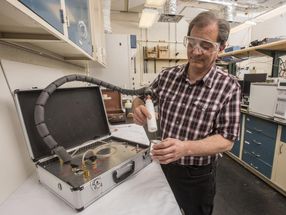IC-MedTech Licenses Promising Cancer Therapeutic From Summa Health System
Dual Small Molecule Approach Demonstrates Ability to Induce a Wide Range of Cancer Cells to Self-Destruct in Animal Models
Indian Creek Medical Technologies, LLC announced it has exclusively licensed a novel anti-cancer therapeutic that, in animal studies, causes a wide variety of cancer cells to self destruct. Developed by Summa scientists, together with research teams from several universities and hospitals in the United States and around the world, Apatone(TM) exploits a novel dual small molecule strategy which induces oxidative stress specifically within cancer cells. This then causes the cancer cells to die without damaging adjacent healthy cells.
"This novel approach could represent a significant advance in cancer treatment," said Tom Miller, CEO of IC-MedTech. "We're pleased to collaborate with Summa's world-class research team to bring this compound into the clinic and ultimately to patients suffering from life-threatening cancers."
In combination with established chemotherapeutic and radiological protocols, Apatone demonstrated enhanced tumor-specific antitumor and antimetastatic activity against human breast, oral epidermoid and endometrial tumor cell lines as well as human prostate cancer cell lines (DU145 and PC3) and a battery of seven other urologic tumor cell lines. Cell lines representing prostate, ovarian, breast, liver, colon, stomach, cervical, kidney, bladder, testicular, cervix, nasopharynx, leukemia and lymphoma respond well to the treatment.
In studies designed to determine the effect of the drug on the life span of nude mice, when combined with known chemotherapeutic regimens, the treatment increased the Mean Survival Time (MST) for laboratory mice representing an Increased Life Span (ILS) of 97.3%.
Initially conceived by Dr. Henryk Taper and reduced to practice by a four member team of cancer researchers, Apatone leverages a novel mechanism of action that shows strong promise as a clinical candidate to be developed for a variety of cancers including ovarian, prostate, renal and pancreatic.
According to Dr. Jim Jamison, lead researcher at Summa associated with the project, Apatone has demonstrated extremely promising results in numerous animal studies and in cell lines from a variety of the most common cancers recognized today. "We look forward to working closely with IC-Medtech to bring Apatone into the clinic for further development as a therapeutic candidate for the treatment of these and other cancers."
A practical version of the chemo-adjunct based on low toxicity compounds to improve safety has been developed for use in clinical trials which are already underway. The treatment can be administered by IV, IP or orally and it has been shown to enhance the performance of at least six different chemotherapeutic drugs (adriamycin, asparaginase, cyclophosphamide, 5-fluorouracil, oncovin and procarbazine).
Topics
Organizations
Other news from the department business & finance

Get the life science industry in your inbox
From now on, don't miss a thing: Our newsletter for biotechnology, pharma and life sciences brings you up to date every Tuesday and Thursday. The latest industry news, product highlights and innovations - compact and easy to understand in your inbox. Researched by us so you don't have to.





















































